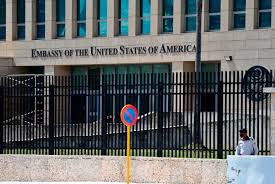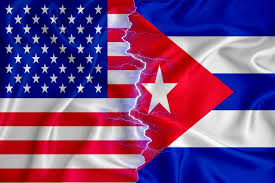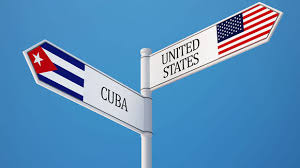
ESTADOS UNIDOS CALIFICA A FIDEL CASTRO DE “MATÓN DESPIADADO” EN UN MENSAJE DIFUNDIDO POR SU EMBAJADA EN CUBA. PHOTOS.
El subsecretario de Estado criticó en X el “fanatismo ideológico” de quienes defienden al régimen cubano. Christopher Landau habló de la crisis de los servicios básicos en la Isla.
LA HABANA- Cuesta creer que, tras décadas de represión, falta de libertades y una crisis económica galopante, todavía haya quienes sigan viendo en Cuba un “paraíso socialista”.
No obstante, este 13 de agosto, cuando se cumplieron 99 años del nacimiento de Fidel Castro, las felicitaciones a la Isla no llegaron solo desde los regímenes aliados, sino también desde sectores afines en todo el mundo. Ese “fanatismo ideológico” fue precisamente lo que criticó el subsecretario de EE UU Christopher Landau este miércoles en X. Más allá de los “mitos”, escribió, “cualquier persona justa y honesta que se acerque a estos temas debería reconocer que Cuba ha sido secuestrada por una pandilla de matones”.
En las antípodas de los despliegues de homenajes y celebraciones que ha orquestado La Habana por el cumpleaños de Castro, Landau no se limitó a señalar el culto a la personalidad en torno al dictador, sino que se propuso desmantelar la mitología revolucionaria. El breve texto, en el que llama a Castro un “matón despiadado”, fue difundido por la Embajada de Washington en la Isla, lo que seguramente acarreará una respuesta oficial de La Habana, que por el momento está inmersa en criticar las sanciones de la Casa Blanca a funcionarios de varios países implicados en la contratación de misiones médicas.
“Cualquier persona en la faz de la Tierra menor de 67 años, incluyéndome a mí, no ha conocido un solo día en el que Cuba no haya estado bajo el régimen dictatorial del partido comunista. No obstante, persisten los mitos de que los líderes comunistas de Cuba son ‘los buenos’ y de que el pueblo cubano está feliz”, inició su mensaje Landau antes de dar paso a una enumeración de cuatro grandes creencias sostenidas sobre el sistema cubano.
CUBA, CALIDAD DE VIDA
El primero gira en torno a la idea de que en Cuba existe una alta calidad de vida, especialmente cuando se habla de salud y educación.
La primera gira en torno a la idea de que en Cuba existe una alta calidad de vida, especialmente cuando se habla de salud y educación. Citando datos que reflejan la migración masiva de los últimos años, el crítico estado del sistema eléctrico o el salario medio de la Isla, Landau argumenta que el nivel de vida no solo es “pésimo”, sino que “sigue empeorando” mientras los cubanos están “huyendo en masa” del país.
“Cuba, que alguna vez fue el mayor exportador de azúcar del mundo, ahora importa más azúcar de la que produce, y la cosecha reciente fue la peor desde el siglo XIX. El acceso a alimentos y suministros médicos básicos (aspirinas, vendas) para el cubano promedio es, en el mejor de los casos, precario”, subrayó, a la par que contrastó el dato con las grandes cantidades de dinero que el país recibe por cada contingente médico que despacha en el mundo. “El régimen cubano y sus apologistas adoran hablar de los médicos cubanos desplegados en otros países. Pero estos médicos no están haciendo caridad (…) y es el propio régimen quien se queda con los pagos”.
MITO SOBRE “LIDERES PROGRESISTAS”
Los gobernantes cubanos tampoco son “líderes progresistas”, prosigue Landau, que asegura que “rara vez mito y realidad han estado tan alejados”. Según alega, tanto Castro como sus seguidores consolidaron su poder “absoluto y perpetuo” a través de métodos violentos y, durante décadas, “han dado refugio a fugitivos de la justicia estadounidense”.
El ex embajador estadounidense también reservó algunas palabras para Ernesto Che Guevara, quien llegó a jactarse abiertamente ante Naciones Unidas de que los “pelotones de fusilamiento eran una herramienta del Gobierno para erradicar a los ‘gusanos’”. La situación que recuerda Landau ocurrió durante una asamblea de la organización en 1964 en la que el argentino llegó a decir, en nombre de Cuba: “hemos fusilado, fusilamos y seguiremos fusilando mientras sea necesario”.

SOBRE LA REPRESION EN CUBA
Landau tampoco pasó por alto la represión que desató el régimen después de las masivas protestas del 11 de julio de 2021. En esas fechas, recordó, fueron arrestadas más de 1.000 personas por crímenes fabricados, como “sedición”, y gran parte de ellos todavía sigue en prisión.
El tercer gran mito de la retórica revolucionaria, explica Landau, es que “los líderes de la dictadura cubana se preocupan por el bienestar del pueblo, no por el suyo propio”
El tercer gran mito de la retórica revolucionaria, explica Landau, es que “los líderes de la dictadura cubana se preocupan por el bienestar del pueblo, no por el suyo propio”. Nada más lejos de la realidad, arguye. “La familia Castro y otros miembros de la élite del régimen (especialmente los líderes militares y de inteligencia) viven en el lujo, con acceso a alimentos, viviendas, automóviles y destinos turísticos, y han acumulado miles de millones de dólares en cuentas bancarias extranjeras mientras el pueblo busca desesperadamente comida y electricidad”.
Para comprobarlo, espeta, basta buscar los perfiles en redes sociales del nieto de Fidel Castro, Sandro, quien se ha declarado influencer y hace gala en sus perfiles del “estilo de vida lujoso de su familia, con ropa de diseñador y una vida de ocio”.
CULPAR AL EMBARGO NORTEAMERICANO
Para rematar, resalta, si alguno de estos mitos se revela como falso, inmediatamente La Habana recurre a culpar al embargo estadounidense de sus problemas. “Pero no existe tal ‘bloqueo’: Cuba es libre de comerciar con otros países y, de hecho, recibe salvavidas económicos del exterior, como petróleo de Venezuela y México, y turistas de Canadá, Europa y otros lugares. La ley estadounidense permite explícitamente la exportación de alimentos y medicinas a Cuba, y la situación humanitaria allí sería mucho peor sin estas exportaciones”, razona el político.
Si alguna vez la Isla estuvo “bloqueada” por EE UU, añade, fue durante la Crisis de los Misiles en 1962, una situación de gran tensión entre Washington y Moscú que duró poco tiempo. “Después de más de sesenta años, es patético que el régimen siga culpando del colapso económico cubano a EE UU en lugar de asumir su propia grotesca mala gestión económica y represión política”.
“El pueblo cubano merece un futuro brillante, y el régimen ni siquiera puede ofrecerle un presente decente. Aspiro a pisar una Cuba libre y próspera, y tengo confianza en que lo haré”, remató Landau, consciente de que los fanatismos ideológicos seguirán creyendo los mitos del castrismo. No obstante, añadió, los fieles de la Revolución “son libres de creer también en unicornios”.
(PLEASE PATRONIZE OUR ADVERTISERS/ ESCOJA/PREFIERA A NUESTROS SPONSORS)

THE UNITED STATES CALLS FIDEL CASTRO A “RUTHLESS BULLY” IN A MESSAGE RELEASED BY ITS EMBASSY IN CUBA. PHOTOS.
The Undersecretary of State criticized the “ideological fanaticism” of those who defend the Cuban regime on X. Christopher Landau spoke about the crisis of basic services on the island.
HAVANA – It is hard to believe that, after decades of repression, lack of freedoms, and a rampant economic crisis, there are still those who continue to see Cuba as a “socialist paradise.”
However, on this August 13, the 99th anniversary of Fidel Castro’s birth, congratulations to the island came not only from allied regimes, but also from like-minded sectors around the world. This “ideological fanaticism” was precisely what US Undersecretary Christopher Landau criticized this Wednesday in X. Beyond the “myths,” he wrote, “any fair and honest person who approaches these issues should recognize that Cuba has been hijacked by a gang of thugs.”
In contrast to the displays of tributes and celebrations that Havana has orchestrated for Castro’s birthday, Landau did not limit himself to pointing out the cult of personality surrounding the dictator, but also set out to dismantle the revolutionary mythology. The brief text, in which he calls Castro a “ruthless thug,” was released by the Washington Embassy on the island, which will surely bring an official response from Havana, which for the moment is immersed in criticizing the White House sanctions against officials from several countries involved in contracting medical missions.
“Any person on the face of the Earth under the age of 67, including myself, hasn’t known a single day when Cuba wasn’t under the dictatorial rule of the Communist Party. However, myths persist that Cuba’s communist leaders are ‘the good guys’ and that the Cuban people are happy,” Landau began his message before listing four major beliefs held about the Cuban system.

CUBA, QUALITY OF LIFE
The first revolves around the idea that Cuba has a high quality of life, especially when it comes to healthcare and education.
The first revolves around the idea that Cuba has a high quality of life, especially when it comes to healthcare and education. Citing data reflecting the mass migration of recent years, the critical state of the electrical system, and the average salary on the island, Landau argues that the standard of living is not only “terrible,” but “continues to worsen” while Cubans are “fleeing en masse” from the country.
“Cuba, once the world’s largest sugar exporter, now imports more sugar than it produces, and the recent harvest was the worst since the 19th century. Access to food and basic medical supplies (aspirin, bandages) for the average Cuban is precarious at best,” he emphasized, while contrasting this figure with the large amounts of money the country receives for each medical contingent it dispatches around the world. “The Cuban regime and its apologists love to talk about Cuban doctors deployed in other countries. But these doctors are not doing charity work (…) and it is the regime itself that keeps the payments.”
MYTH ABOUT “PROGRESSIVE LEADERS”
Cuban leaders are not “progressive leaders” either, Landau continues, asserting that “myth and reality have rarely been so far apart.” He alleges that both Castro and his followers consolidated their “absolute and perpetual” power through violent methods and, for decades, “have given refuge to fugitives from US justice.”
The former US ambassador also had a few words for Ernesto Che Guevara, who openly boasted before the United Nations that “firing squads were a tool of the government to eradicate the ‘worms.'” The situation Landau recalls occurred during a 1964 assembly of the organization, during which the Argentine said, on behalf of Cuba: “We have executed, we are executing, and we will continue executing as long as necessary.”
ON REPRESSION IN CUBA
Landau also did not overlook the repression unleashed by the regime after the massive protests of July 11, 2021. On those dates, he recalled, more than 1,000 people were arrested for fabricated crimes, such as “sedition,” and many of them are still in prison.
The third great myth of revolutionary rhetoric, Landau explains, is that “the leaders of the Cuban dictatorship care about the well-being of the people, not their own.”
The third great myth of revolutionary rhetoric, Landau explains, is that “the leaders of the Cuban dictatorship care about the well-being of the people, not their own.” Nothing could be further from the truth, he argues. “The Castro family and other members of the regime’s elite (especially military and intelligence leaders) live in luxury, with access to food, housing, cars, and tourist destinations, and have accumulated billions of dollars in foreign bank accounts while the people desperately search for food and electricity.”
To prove this, he argues, just look at the social media profiles of Fidel Castro’s grandson, Sandro, who has declared himself an influencer and boasts on his profiles about “his family’s luxurious lifestyle, with designer clothes and a life of leisure.”
BLAME THE US EMBARGO
To top it off, he emphasizes, if any of these myths are revealed to be false, Havana immediately resorts to blaming the US embargo for its problems. “But there is no such thing as a ‘blockade’: Cuba is free to trade with other countries and, in fact, receives economic lifelines from abroad, such as oil from Venezuela and Mexico, and tourists from Canada, Europe, and elsewhere. US law explicitly allows the export of food and medicine to Cuba, and the humanitarian situation there would be much worse without these exports,” the politician reasons.
If the island was ever “blockaded” by the US, he adds, it was during the 1962 Missile Crisis, a situation of great tension between Washington and Moscow that lasted only a short time. “After more than sixty years, it is pathetic that the regime continues to blame the US for Cuba’s economic collapse instead of addressing its own grotesque economic mismanagement and political repression.”
“The Cuban people deserve a bright future, and the regime can’t even offer them a decent present. I aspire to set foot in a free and prosperous Cuba, and I am confident that I will,” Landau concluded, aware that ideological fanaticism will continue to believe in the myths of Castroism. However, he added, those faithful to the Revolution “are free to believe in unicorns, too.”
(PLEASE PATRONIZE OUR ADVERTISERS/ ESCOJA/PREFIERA A NUESTROS SPONSORS)

Agencies/ 14yMedio/ La Habana/ Internet Photos/ www.TheCubanHistory.com/ Arnoldo Varona.
THE CUBAN HISTORY, HOLLYWOOD.




